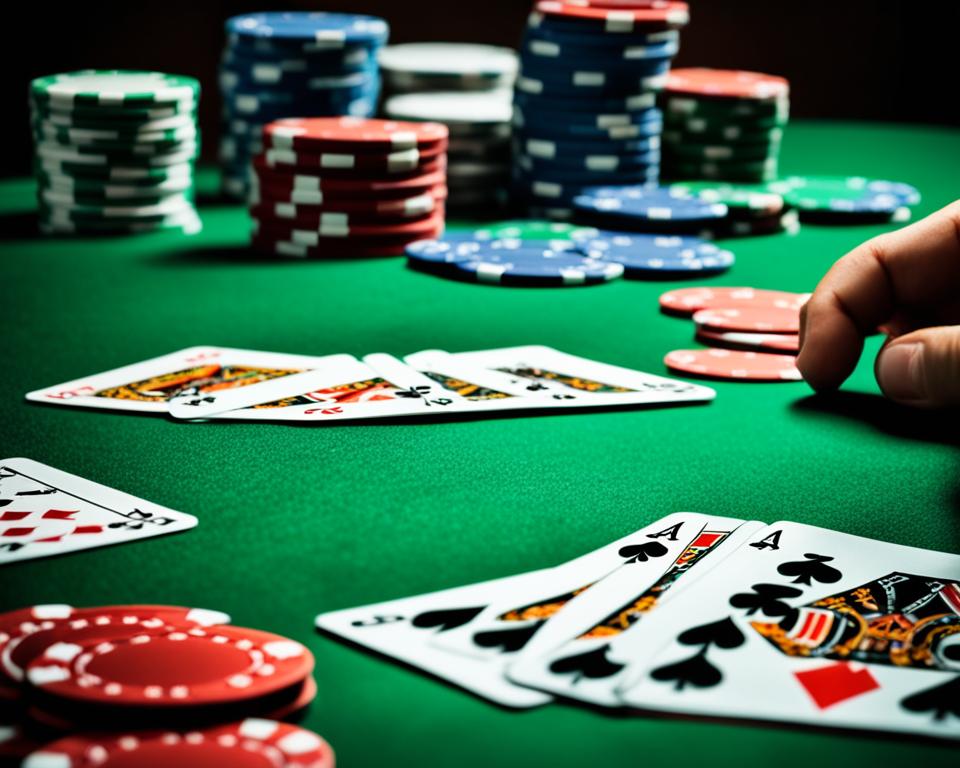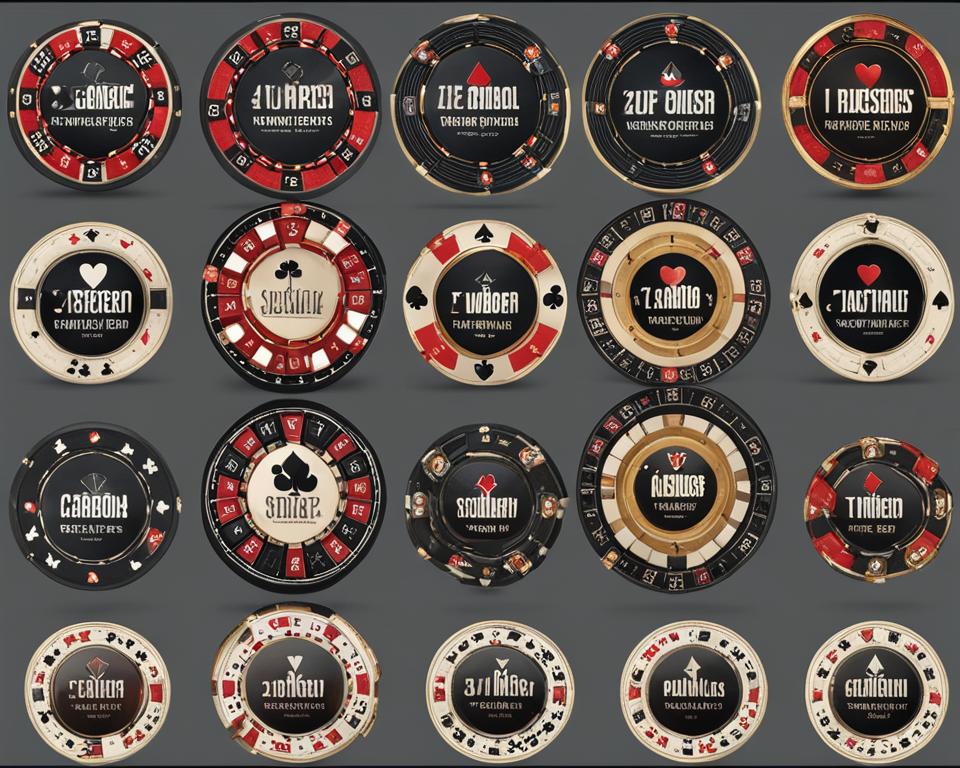Poker is an easy game to learn, but mastering it takes time and practice. These poker tips for beginners will help new players increase their chances of winning at the table and start their poker journey on the right foot.
Key Takeaways:
- Learn and apply beginner poker strategies to improve your gameplay.
- Play aggressively with strong hands to put pressure on your opponents.
- Practice patience and wait for good hands before making big bets or raises.
- Observe your opponents’ actions and betting patterns to gain valuable insights.
- Manage your bankroll effectively and play within your limits to avoid going broke.
Aggression Pays in Poker
When it comes to poker strategies for beginners, one key tactic that can greatly enhance your gameplay is aggression. By playing aggressively and leveraging your strong hands, you can apply pressure to your opponents and increase your chances of winning. Aggressive betting and raising can force weaker players to fold, allowing you to claim the pot more frequently and accumulate chips.
Playing aggressively in poker involves making bold moves, such as making larger bets and raises, to assert dominance and intimidate your opponents. This strategy can be highly effective, especially against more passive players who are prone to folding under pressure.
One of the main advantages of aggression in poker is that it allows you to dictate the flow of the game. By taking control of the betting action, you force your opponents to make tough decisions and potentially make mistakes. This can give you a significant edge in the game and maximize your chances of coming out on top.
However, it’s important to note that playing aggressively does carry some risk. It requires a solid understanding of hand strength and the ability to read your opponents’ reactions. Overplaying mediocre hands or adopting an overly aggressive approach without proper judgment can backfire and lead to significant losses.
When implementing an aggressive strategy in poker, timing and selective aggression are crucial. It’s essential to recognize favorable situations where aggression is most likely to pay off. This includes when you have a strong hand, when your opponents appear weak, or when the board favors your cards.
“Playing aggressively in poker is like putting your foot on the accelerator. It’s a bold move that can propel you to victory, but you must use it strategically and with precision.”
Remember, playing aggressively in poker is not about mindlessly betting or raising every hand. It’s about strategic and calculated aggression that puts you in control of the game. By mastering the art of aggression, you can become a formidable player at the poker table.
| Advantages | Considerations |
|---|---|
| 1. Puts pressure on opponents | 1. Requires accurate hand reading |
| 2. Increases chances of winning | 2. Can lead to costly mistakes if overused |
| 3. Allows for control of the game | 3. Timing and selective aggression are essential |
| 4. Forces weaker players to fold | 4. Requires a balance with hand strength |
Patience is Key
While aggression is important in poker, beginners should also exercise patience in their gameplay. By waiting for strong hands and folding more often, beginners can avoid costly mistakes and make more informed decisions at the table. Good hand selection is crucial, so it’s important for beginners to fold when they don’t have strong starting hands.
Patience in Poker: Folding in Poker, Waiting for Good Hands
Patience plays a vital role in a beginner’s poker strategy. Rather than chasing every hand or trying to force a win, it’s often wiser to wait for good starting hands and fold when the cards aren’t in your favor. This allows beginners to conserve their chips and avoid unnecessary risks.
When players exercise patience, they are less likely to fall into traps set by more experienced opponents. By resisting the impulse to play every hand, beginners can avoid making hasty decisions and falling victim to bluffs or strong hands from their opponents.
In poker, patience goes hand in hand with discipline. It takes discipline to fold weak starting hands and wait for better opportunities to make profitable plays at the table. While it might seem frustrating to fold hand after hand, the patient player understands that the game is a marathon, not a sprint.
“Patience is a key virtue in poker. It allows you to minimize risks, avoid bad beats, and make better decisions when the time is right. Folding is not a sign of weakness, but a sign of strategic thinking and self-control. Remember, a good hand will come eventually, so don’t get impatient and let your ego get in the way.”
Patience also plays a crucial role in learning the game. By observing other players’ actions and the flow of the game, beginners can gain valuable insights and develop a better understanding of poker strategies. This observational approach helps in reading opponents’ patterns and making more accurate decisions.
One effective way to cultivate patience in poker is to set realistic expectations. Understanding that the game involves ups and downs, wins and losses, helps players maintain composure and stay focused on long-term success. It’s important to remember that poker is a game of skill, and patience is one of the skills that can truly make a difference in the outcome.
| Benefits of Patience in Poker | How to Practice Patience |
|---|---|
| 1. Avoiding costly mistakes | 1. Take time to analyze hands before making decisions |
| 2. Making more informed decisions | 2. Be mindful of the table dynamics and adjust accordingly |
| 3. Conserving chips and bankroll | 3. Set a limit to the number of hands played per session |
| 4. Minimizing risks and bad beats | 4. Focus on the long-term and don’t get caught up in short-term losses |
By combining patience with other essential poker skills, beginners can build a solid foundation for success at the table. Remember, poker is a game of strategy, and patience is a strategic asset that can help players navigate the ups and downs of the game.
Observe Your Opponents
Poker is not just a game of cards, it’s a game of people. Understanding your opponents can give you a significant advantage at the poker table. By observing their betting patterns, body language, and previous actions, you can gain valuable insights into their hand strength and intentions. This skill is crucial for playing winning poker.
“The ability to read your opponents separates the good players from the great players.” -Daniel Negreanu
When you observe your opponents, look for “poker tells.” These are subconscious actions or behaviors that reveal the strength or weakness of their hand. It could be a glance at their chips, a change in breathing pattern, or even a slight twitch of a facial muscle. These subtle cues can provide vital clues about their next move, allowing you to make more accurate decisions.
Playing the Player
Playing the player means taking into account your opponents’ playing style, tendencies, and reactions. Each player has a unique approach to the game, and by understanding their individual behavior, you can adjust your strategy accordingly. If you notice that a player is consistently aggressive, you can use their aggression against them by trapping them with strong hands. Conversely, if a player is tight and only plays premium hands, you can exploit their cautious nature by bluffing more frequently.
Playing the player also involves adapting to the table dynamics. By identifying who the strong and weak players are, you can target the weaker opponents while avoiding confrontations with the stronger ones. This strategic approach helps maximize your winnings and minimize your losses.
Ultimately, successful poker players know that the game is not just about the cards they hold, but about understanding and utilizing the information provided by their opponents. By observing their opponents, reading poker tells, and playing the player, beginners can develop a strong foundation for success in the game of poker.
| Benefits of Observing Opponents | Actions to Take |
|---|---|
| Gain insights into opponents’ hand strength and intentions | Watch for betting patterns and body language |
| Identify opponents’ poker tells | Look for subtle behavioral cues |
| Adjust your strategy based on opponents’ playing style | Adapt to aggressive or tight opponents |
| Maximize winnings by targeting weaker opponents | Identify the strong and weak players at the table |
Play Within Your Bankroll
When it comes to playing poker, beginners often get caught up in the excitement and can easily find themselves in financial trouble. That’s why it’s crucial to prioritize bankroll management and play with proper limits. By adhering to these principles, poker players can set themselves up for long-term success at the table.
Bankroll management involves carefully allocating your available funds for poker and ensuring you have enough to sustain your gameplay over an extended period. It’s essential to establish a poker bankroll separate from your everyday finances to prevent any financial strain or potential loss. By doing so, you can enjoy the game without the stress of risking more than you can afford.
Playing with proper limits is another essential aspect of bankroll management. Beginners should start at low-stakes tables where the buy-ins are affordable and manageable. This approach allows players to gain experience, build their skills, and gradually increase their limits as their bankroll grows. It’s crucial to resist the temptation to play above your limits, as this can lead to significant losses and hinder your progress as a player.
“Playing within your bankroll is a fundamental principle that every poker player should follow. It not only protects your financial well-being but also ensures a more enjoyable and sustainable poker journey.”
By playing within your bankroll, you can minimize the risk of going broke and give yourself the opportunity to learn and improve. Remember, poker is a game of skill, and it’s important to invest time and effort in honing your abilities. As your bankroll grows, you can consider moving up in stakes and challenging yourself against stronger opponents.
To illustrate the importance of bankroll management and playing with proper limits, here’s a table outlining bankroll recommendations for different poker formats:
| Poker Format | Bankroll Recommendation |
|---|---|
| Cash Games | 20-30 buy-ins |
| Sit and Go Tournaments | 50-100 buy-ins |
| Multi-Table Tournaments | 100-200 buy-ins |
While these are general guidelines, it’s important to adapt them to your individual playing style, skill level, and risk tolerance. Bankroll management should always be a priority, regardless of your preferred poker format.
Play with discipline, manage your bankroll effectively, and you’ll set yourself up for success at the poker table.
Develop Your Skills
Poker is a skill-based game that requires constant improvement and learning. As a beginner, it’s essential to focus on developing your skills through practice and study. By dedicating time and effort to improving your poker skills, you can elevate your gameplay and increase your chances of success at the table.
Learning Poker Strategy
Learning poker strategy is a crucial aspect of skill development. By understanding different poker tactics and techniques, you can make more informed decisions during gameplay. There are various resources available to help you learn poker strategy, such as books, online tutorials, and video courses.
“Learning from experienced players and experts in the field can provide valuable insights into the strategic nuances of the game.”
Reading poker books written by renowned players and experts can offer in-depth explanations of various strategies and concepts. These books often provide practical advice and real-life scenarios that can enhance your understanding of poker strategy.
Watching videos and tutorials, both online and offline, can also contribute to your knowledge and skill development. Many professional players share their gameplay analysis, tips, and tricks through videos, allowing you to learn from their experiences and insights. Additionally, observing live poker tournaments or streams can give you a glimpse into high-level poker strategy.
Practicing Poker
Practice is fundamental to improving your poker skills. By actively participating in poker games and practicing different strategies, you can refine your decision-making abilities and adapt to various situations that arise at the table.
One effective way to practice poker is through online platforms, where you can play against real players from around the world. Online poker provides a convenient and accessible environment to sharpen your skills, try out different strategies, and gain experience in different game formats.
Another beneficial practice method is analyzing your own gameplay. By reviewing your hands, identifying mistakes, and reflecting on your decisions, you can identify areas for improvement and make adjustments to your strategy. Taking notes and keeping a poker journal can serve as valuable references for future games as well.
Remember, practice and continuous learning are key to becoming a successful poker player. Dedicate time to develop your skills, study poker strategy, and actively engage in gameplay. By doing so, you can enhance your understanding of the game, make better decisions, and increase your overall chances of winning at the poker table.
Position is Power
Your position at the poker table can significantly influence your chances of winning. Understanding the concept of position and playing strategically according to your table position can give you a competitive edge over your opponents.
When you are in a late position, such as the button or cutoff, you have the advantage of seeing how other players act before you make your decision. This extra information allows you to make more informed bets and raises based on your opponents’ actions, hand range, and overall strategies.
Playing in a late position gives you the opportunity to observe your opponents’ gameplay and adjust your strategy accordingly. If you notice that your opponents are playing passively, you can take advantage of this by increasing your aggression and bluffing more frequently. Similarly, if you identify a player who is consistently raising or betting aggressively, you can adjust your gameplay by either folding or trapping them with strong hands.
On the other hand, being in an early position, such as under the gun, can be more challenging as you have less information about your opponents’ intentions. It is crucial to exercise caution and play more selectively when you are in an early position. Focus on playing premium hands and avoid unnecessary risks.
To maximize your advantage and increase your winning potential, it is essential to adapt your strategy based on your position at the poker table. By playing positionally, you can make better decisions, exploit your opponents’ weaknesses, and ultimately improve your overall profitability. Remember, position is power in poker.

Learn the Poker Lingo
Poker has its own unique language and terminology, and beginners should familiarize themselves with the common poker terms. Understanding these phrases is essential for effective communication with other players and for comprehending strategy discussions and resources. Here are some key poker terms every beginner should know:
Poker Terms
| Term | Definition |
|---|---|
| Bluff | to make a bet or raise with a weak hand, aiming to deceive opponents into folding stronger hands |
| Call | to match a previous bet or raise, remaining in the hand |
| Raise | to increase the amount of the previous bet, forcing other players to call, raise, or fold |
| Check | to decline the option to bet when it is one’s turn, passing the action to the next player |
| Fold | to discard one’s hand and forfeit the current pot, no longer participating in the hand |
These are just a few examples of the many poker terms you may encounter at the table. By understanding and using these terms correctly, beginners can communicate effectively with other players and gain a better understanding of the game.
Don’t Bluff Too Much
Bluffing is a tactical move in poker that can keep your opponents guessing and potentially lead to big wins. However, beginners should approach bluffing with caution and avoid relying too heavily on this strategy. It’s essential to understand when to bluff and how to do it effectively in order to avoid excessive bluffing that can backfire.
One key factor in successful bluffing is having knowledge of your opponents’ tendencies. By observing their gameplay and betting patterns, you can get a sense of how likely they are to fold under pressure. Bluffing against opponents who tend to call or raise frequently is riskier and may not yield the desired outcome. On the other hand, bluffing against cautious players who are more likely to fold can be a more profitable move.
Accurately reading your opponents’ reactions is another crucial aspect of bluffing. Facial expressions, body language, and timing can provide valuable clues about the strength of their hand. Look for signs of discomfort, hesitation, or sudden confidence shifts. These can indicate weakness and potential opportunities to bluff. However, keep in mind that some players are skilled at masking their emotions, so it’s important to consider the overall context of the game before making a bluff.
For beginners, it’s advisable to focus more on playing solid hands and making value bets rather than relying excessively on bluffing. Building a strong foundation based on sound poker fundamentals will provide a more reliable path to success. By understanding the value of your own hand and making strategic decisions based on that, you can maximize your chances of winning pots, even without heavy reliance on bluffing.
“Bluffing is like a spice; it’s used to enhance the dish, but too much can ruin the flavor.” – Daniel Negreanu
Bluffing can be an exciting and potentially profitable strategy, but it should be used sparingly and with careful consideration. Beginners should focus on developing their skills, observing opponents, and playing solid hands. As you gain more experience and learn to read your opponents better, you can gradually incorporate bluffing into your repertoire of poker strategies.
Remember, the key to successful bluffing lies in timing, observation, and understanding your opponents. With practice and strategic play, you can become a more well-rounded and formidable poker player.

Common Mistakes to Avoid When Bluffing
- Bluffing too frequently without considering the specific dynamics of each hand and opponent
- Bluffing with weak or mediocre hands, which can be easily called or raised
- Overvaluing the strength of your own bluff and making unnecessarily large bets
- Bluffing in situations where the pot odds make it more lucrative to fold
- Bluffing without backup plans or alternative strategies if your bluff is called
Conclusion
In conclusion, these easy poker tips for beginners provide a comprehensive summary of strategies to help new players succeed at the poker table. By combining aggression with patience, beginners can create a winning approach that puts pressure on opponents while avoiding costly mistakes. Additionally, observing opponents and playing strategically based on their actions can give beginners a significant edge in gameplay.
Bankroll management is crucial, as playing within one’s means ensures long-term success and mitigates the risk of financial setbacks. Moreover, developing poker skills through continuous learning, practice, and analysis is essential for improving gameplay and making informed decisions.
Consideration of position and understanding poker lingo are also key factors in the pursuit of victory. By leveraging advantageous table positions and familiarizing themselves with common poker terms, beginners can communicate effectively and maximize their strategic potential.
Avoiding excessive bluffing is advised, as this tactic requires experience and reading opponents accurately. Instead, beginners should focus on playing solid hands and making value bets to maximize their chances of winning.
To summarize, these poker tips for beginners provide a solid foundation for success in the game. By combining aggression, patience, observation, proper bankroll management, skill development, positional advantage, poker lingo understanding, and strategic play, beginners can improve their chances of winning and enjoy the exciting world of poker. Remember, practice and continuous learning are paramount to mastering this captivating game.
FAQ
What are some easy poker tips for beginners?
Beginners can improve their poker game by playing aggressively, exercising patience, observing opponents, managing their bankroll effectively, developing their skills through practice and study, leveraging their position at the table, familiarizing themselves with poker terms, and avoiding excessive bluffing.
Why is aggression important in poker?
Playing aggressively in poker, such as through betting and raising with strong hands, can put pressure on opponents and increase the chances of winning. Aggression can force weaker players to fold and win pots more frequently.
How can beginners exercise patience in poker?
Beginners can exercise patience in poker by folding more often and waiting for strong starting hands. This helps them avoid costly mistakes and make more informed decisions. Good hand selection is crucial, so beginners should fold when they don’t have strong starting hands.
Why is it important to observe opponents in poker?
Observing opponents’ betting patterns, body language, and previous actions can provide valuable insights into their hand strength and intentions. By playing the player and not just the cards, beginners can make more accurate decisions at the poker table.
How can beginners play within their bankroll?
Beginners should manage their bankroll effectively by playing within their means and sticking to proper limits. This ensures long-term success in poker and helps avoid going broke. By managing their bankroll, beginners can continue to build their skills and experience at the table.
How can beginners develop their poker skills?
Beginners can develop their poker skills through practice and study. Reading poker books, watching videos, and analyzing their own gameplay can contribute to improving their understanding of the game and honing their strategies. Continual learning and skill development are key to becoming successful poker players.
Why is position important in poker?
Position at the poker table can have a significant impact on a player’s chances of winning. Being in a late position provides more information about opponents’ actions before making decisions. This strategic advantage allows players to make more informed bets and raises.
How can beginners learn the poker lingo?
Beginners can familiarize themselves with common poker terms by learning phrases like “three-bet,” “cut-off,” and “open-ended straight draw.” Understanding poker lingo helps communicate effectively with other players and understand strategy discussions and resources.
Should beginners bluff in poker?
While bluffing can be an effective strategy in poker, beginners should exercise caution and avoid bluffing too frequently. Bluffing requires knowledge of opponents’ tendencies and the ability to read their reactions accurately. Beginners should focus on playing solid hands and making value bets instead.





